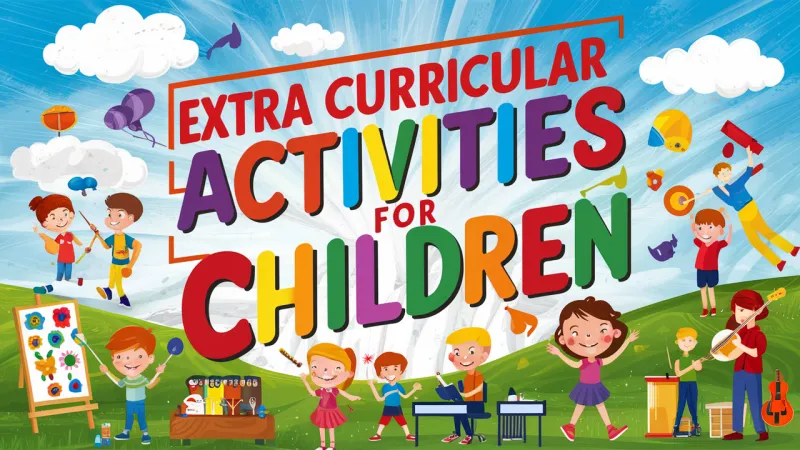A Guide On Extracurricular Activities for Children
A Guide On Extracurricular Activities for Children
Today's blog is about the extracurricular activities for children. We know that you might first want to understand this word. So, before diving into this important and interesting topic, let's first know about this term.

What are extracurricular activities?
To put it in simple terms, extracurricular activities are nothing but structured activities that children participate in outside of their regular school curriculum. The word 'extra' in extracurricular depict that they are outside the daily academic curriculum.
These can include sports teams, coding classes, community theatre, academic clubs like math club, science club, English club, and various educational activities for students. It is important to know that while these activities are not a core part of school curriculum, they play a vital role in shaping your child's overall development and success.
Why are extracurricular activities important for children?
Well, these extracurricular activities are a key factor in your child's growth and development journey. They allow your child to go beyond classroom learning and explore interests that could shape their future. In fact, educational research shows that participating in these educational activities for students from a young age helps children develop strong and critical skills that cannot be inculcated through fixed academic curriculum alone.
Whether it's joining a sports team, arts club, cooking club, math club, or taking part in community service clubs, these life skills activities will teach some great lessons about creativity and teamwork.

Benefits of extracurricular activities for children
Some of the amazing benefits of extracurricular activities are:
Develops leadership skills: When a child participates in activities like community theater or captaining a sports team, it allows them to develop strong leadership skills. The experiences they gain from them teaches how to motivate peers, take responsibility and guide a group toward achieving a common goal. The research also points out this benefit. Hence, these activities are important for them to succeed in future.
Enhances good time management skills: When a child juggles extracurricular activities with daily classroom learning, it helps them develop good time management skills. They learn how to prioritize their tasks, achieve deadlines and balance multiple tasks or responsibilities. This is an essential skill that will benefit them both in school and personal life.
Builds social skills and friendships: When children become a part of an activity club like a math club, music group or community service club, they talk and interact with other members or peers and form meaningful bonds. They learn how to work together, solve problems, support each other and develop strong friendships which ultimately builds social skills.
Develops creativity and personal growth: Children develop creativity when they take part in various activities such as music groups or community theatre. It helps them think outside the box and find new interests and passions while developing critical thinking and problem-solving skills. This complements their academic curriculum and helps in personal growth.
Encourages fun and reduces stress: Children get the chance to have fun and unwind from their fixed school routine by involving themselves in extracurricular activities. Activities like coding, painting, sports, cooking, etc. allow them to release stress, enjoy their time with friends and stay focused. This, in turn, enhances their physical and mental well-being.
Improves college admissions prospects: High school students who engage in extracurricular activities from young age often become all-rounded individuals in colleges. These activities reveal their commitment, passion and leadership qualities. It also helps them to stand out in their college admissions and applications.

Top 5 extracurricular activities for your children
Here are the top five extracurricular activities that your children should take part in:
Coding: One of the most popular and beneficial extracurricular activities is coding particularly in the countries like US and Canada. This activity equips your child with necessary skills for their future and also enhances classroom learning in subjects like math and science. Codeyoung offers coding programs that teach kids how to think logically, solve problems and work on creative projects.
Robotics: Another great activity for your child is robotics which helps in combining creativity with technology. Children not only learn how to design and build machines but also inculcate good time management and cognitive skills and teamwork. This has been shown by research as well. It is also hands-on activity that nurtures innovation and problem-solving which is greatly valued in education across Canada, US and North America.
Math club: If your child wants to excel or improve their mathematical abilities, joining a math club is a perfect choice. Children deepen their understanding of math concepts, participate in challenges and collaborate with other members by becoming a part of these clubs. Codeyoung also provides an interactive mathematics program where children learn important things related to math in a fun and engaging way.
Music groups: Children who are passionate about arts can join a music group to explore their talents while developing discipline and teamwork. They express themselves freely when they play in a band or sing in a choir. It also build leadership skills and friendships. This activity also improves the focus and also benefits the academic performance.
Community service clubs: Children develop a sense of responsibility and empathy by participating in communities that work for the betterment of surroundings like organizing a neighborhood clean-up to improve the environment, volunteering at a local food bank to help families in need, participating in fundraising or charitable organizations, etc. These service clubs encourage children to work with community organizations to make good impact and get positive outcomes. Children learn the value of giving back.

Choosing the right extracurricular activity for your child
Selecting the right extracurricular activity for your child can feel overwhelming, as there are so many options available. It's crucial to choose activities that not only align with your child's unique interests and personality but also enhance their overall development. Life skills activities can be particularly beneficial, as they teach essential skills like communication, teamwork, and problem-solving. Additionally, incorporating educational activities for students can provide opportunities for intellectual growth while still being fun and engaging. By finding the right balance, you can ensure your child enjoys a well-rounded and fulfilling experience.
Getting started with extracurricular activities
Start by observing what excites them. Are they passionate about technology, arts, or sports? The key or tip is to choose educational activities for students that they will genuinely enjoy. These could include life skills activities or extracurricular activities tailored to their interests. This approach will increase their engagement and ensure they stick with it long-term. For example, if your child enjoys math, you could encourage them to join a math club or participate in other related educational activities for students to nurture their passion.
Research the various options available in your community. Reach out to your child’s teacher or school counselor for information on school-based activities. Explore local community organizations like theater groups, sports teams, and also consider enrolling your child in specialized courses
There are many schools and organizations that offer a variety of extracurricular activities to meet the diverse interests and needs of children. Check what your child's school offers, the most common extracurricular activity options include sports, academic clubs or artistic programs like music groups. You can also look for local community organizations that run after-school programs to find opportunities or activities your child maybe more interested in.
Search online for extracurricular activities in your area, using keywords like “extracurricular activities for kids” or “community service opportunities for teens.”
You can also explore options like Codeyoung's courses which offer engaging programs in math, science and English. Codeyoung's platform is an excellent way for students to explore new subjects while building confidence in their academic abilities.
Setting goals and expectations
Also, it is important to consider your child's schedule when selecting educational activities for students. It sounds good to enroll them in multiple activities, but in the end, it is important to choose one or two activities they are truly interested in to help them balance their schoolwork and free time. Make sure your child understands the time commitment required for the activity and is willing to make a commitment to participate.
Besides, factor in any costs involved, as some extracurricular activities may need extra fees for materials or travel. You should talk to your child about their goals and see if they want to develop friendships or engage in life skills activities, such as clubs or sports, where they can learn new skills and meet new people.
Remember that the right activity will encourage your child to pursue their passion, build new skills and grow as a student.
Supporting your child’s extracurricular activity
Some of the ways in which parents can support their child's extracurricular activity are:
Encourage your child's interest by discussing the program they want to join and how it fits their goals.
Set a budget for extracurriculars to manage costs effectively and avoid overspending on money.
To support your child’s extracurricular activity, play an important role by staying involved in their progress, attending their events and performances whenever possible.
Encourage your child to take ownership of their activity, such as by helping with fundraising or volunteering.
Provide transportation and other logistical support as needed.
Offer emotional support and encouragement, and help your child develop a growth mindset.
Emphasize the benefits of the activity explaining how it complements their classroom learning and skill development.
Help your child balance education and extracurriculars. Make sure their student life remains focused on both school work and personal interests.
Finding balance between education and extracurricular activities
Although it is important for your child to explore various activities, finding a balance between education and extracurricular is key. As parents, you have to make sure that your child is enrolled in a program that not only sharpens them and ignites their passion but also fits well with their academic schedule and regular curriculum.
This balance will help your child enjoy the benefits of after-school activities without feeling burdened by school work. Research shows that when students find this equilibrium they perform better both in and out of the classroom.
Participating in the right program will definitely help your child grow, develop friendships and excel in school subjects in the long run, ultimately laying the foundation for a bright future.
Frequently Asked Questions (FAQs)
At what age should kids start extracurricular activities?
There's no one-size-fits-all answer, but many kids start exploring extracurricular activities around age 5 or 6. At this age, children are usually ready to engage in structured programs outside their regular school curriculum. However, it's essential to consider your child's interests, maturity level, and ability to balance such activities with schoolwork. Some parents introduce their kids to light, fun programs even earlier to help develop social skills and explore interests.
What are some examples of the best extracurricular activities?
Some of the best extracurricular activities for students include sports teams, music lessons, art classes, coding clubs, and volunteer work. These programs often help kids develop new skills, make friends, and gain a greater sense of confidence. Many schools offer a variety of extracurricular options, but community centers and local organizations also provide excellent choices. It's important to consider your child's interests and goals when selecting activities.
How many extracurricular activities are appropriate for a 7-year-old?
For a 7-year-old, one or two extracurricular activities are usually sufficient. At this age, it's crucial to maintain a balance between school, play, and structured activities. Overscheduling can lead to stress and burnout, so it's best to start slowly and gauge your child's interest and energy levels. Remember that downtime is also important for a child's development, so leave room for free play and relaxation.
Are extracurricular activities good for kids?
Yes, extracurricular activities can be highly beneficial for kids. Such activities often help students develop important life skills like teamwork, time management, and perseverance. They can also boost self-esteem, provide opportunities for socializing, and help children discover new passions. Many colleges look favorably upon a well-rounded extracurricular profile when considering applicants. However, it's important to ensure that these activities don't interfere with a child's academic performance or cause undue stress.
What are extracurricular activities, and what are some examples?
Extracurricular activities are programs or pursuits that students engage in outside of their regular school curriculum. Examples include sports (like soccer or swimming), artistic endeavors (such as drama club or painting classes), academic clubs (like debate team or science Olympiad), and community service. These activities can take place at school or through external organizations. The best extracurricular activities align with a student's interests while also helping them develop new skills and explore potential career paths.